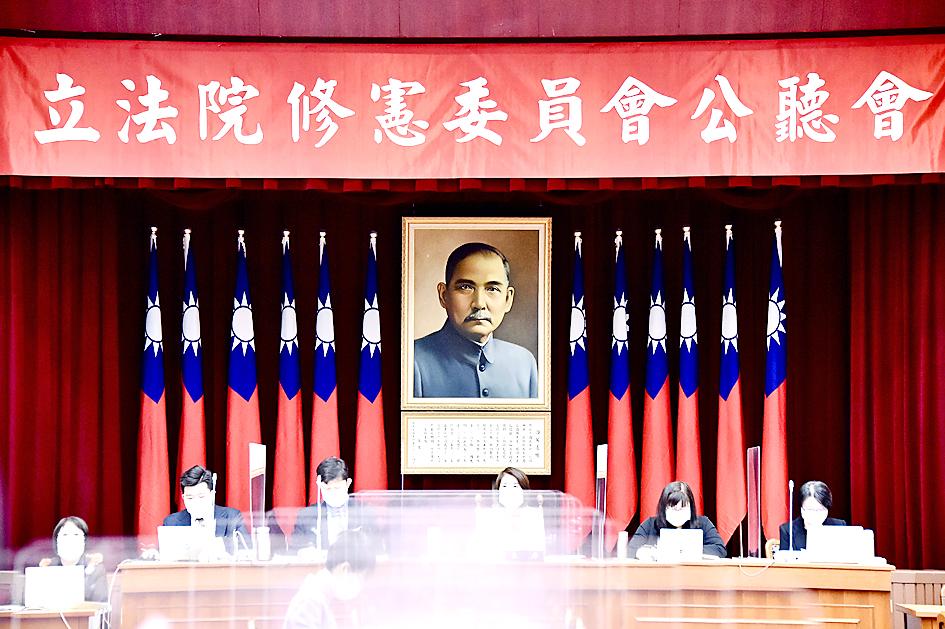No Chinese Nationalist Party (KMT) legislators yesterday attended a public hearing of the Legislative Yuan’s Constitutional Amendment Committee.
The legislative caucuses in 2020 established the committee amid calls to amend the Constitution, appointing 39 members based on a party’s proportion of seats in the legislature.
DPP Legislator Chou Chun-mi (周春米) convened yesterday’s session, which included DPP members, New Power Party legislators Chen Jiau-hua (陳椒華) and Claire Wang (王婉瑜), and Taiwan People’s Party Legislator Jang Chyi-lu (張其祿).

Photo: Tu Chien-jung, Taipei Times
The KMT members of the committee on Wednesday said they would not participate, saying that the DPP had last week contravened legislative procedure in choosing Chou as convener in the opening session before KMT legislators had arrived.
“The KMT will not participate because the DPP is faking the process to deceive the public... The agenda and procedures were set by the DPP,” KMT Legislator William Tseng (曾銘宗) said on Wednesday, adding that the DPP “must bear total responsibility for the failure of the constitutional amendment process.”
DPP Legislator Chen Ting-fei (陳亭妃) yesterday said that the KMT was sabotaging the process by boycotting it, adding that the “KMT’s goal is to ruin the constitutional amendment process.”
At yesterday’s meeting, Academia Sinica law researcher Su Yen-tu (蘇彥圖) told the committee that there is general agreement in Taiwan for “granting civil rights to adults at the age of 18, and also to give them voting rights.”
“Therefore the issue should be a priority for the committee, and does not need to go through any hard bargaining process,” he said.
Taiwan Youth Association for Democracy head Alvin Chang (張育萌) said that Taiwan needs to catch up on rights for young people, as “Japan, South Korea and Malaysia have amended their constitutions to grant voting and civil rights to people at 18 years old.”
Taiwan Forever Association chairman Huang Di-ying (黃帝穎) said that it had been more than 15 years since a committee was convened to amend the Constitution, “while our nation’s framework and government have encountered many challenges and difficulties.”
“The threshold for amending the Constitution must be dealt with by this committee, as it is too high, requiring three-quarters of legislators to vote in approval,” he said. “This is among the highest threshold requirements, and should be lowered.”

Taiwan has received more than US$70 million in royalties as of the end of last year from developing the F-16V jet as countries worldwide purchase or upgrade to this popular model, government and military officials said on Saturday. Taiwan funded the development of the F-16V jet and ended up the sole investor as other countries withdrew from the program. Now the F-16V is increasingly popular and countries must pay Taiwan a percentage in royalties when they purchase new F-16V aircraft or upgrade older F-16 models. The next five years are expected to be the peak for these royalties, with Taiwan potentially earning

STAY IN YOUR LANE: As the US and Israel attack Iran, the ministry has warned China not to overstep by including Taiwanese citizens in its evacuation orders The Ministry of Foreign Affairs (MOFA) yesterday rebuked a statement by China’s embassy in Israel that it would evacuate Taiwanese holders of Chinese travel documents from Israel amid the latter’s escalating conflict with Iran. Tensions have risen across the Middle East in the wake of US and Israeli airstrikes on Iran beginning Saturday. China subsequently issued an evacuation notice for its citizens. In a news release, the Chinese embassy in Israel said holders of “Taiwan compatriot permits (台胞證)” issued to Taiwanese nationals by Chinese authorities for travel to China — could register for evacuation to Egypt. In Taipei, the ministry yesterday said Taiwan

Taiwan is awaiting official notification from the US regarding the status of the Agreement on Reciprocal Trade (ART) after the US Supreme Court ruled US President Donald Trump's global tariffs unconstitutional. Speaking to reporters before a legislative hearing today, Premier Cho Jung-tai (卓榮泰) said that Taiwan's negotiation team remains focused on ensuring that the bilateral trade deal remains intact despite the legal challenge to Trump's tariff policy. "The US has pledged to notify its trade partners once the subsequent administrative and legal processes are finalized, and that certainly includes Taiwan," Cho said when asked about opposition parties’ doubts that the ART was

If China chose to invade Taiwan tomorrow, it would only have to sever three undersea fiber-optic cable clusters to cause a data blackout, Jason Hsu (許毓仁), a senior fellow at the Hudson Institute and former Chinese Nationalist Party (KMT) legislator, told a US security panel yesterday. In a Taiwan contingency, cable disruption would be one of the earliest preinvasion actions and the signal that escalation had begun, he said, adding that Taiwan’s current cable repair capabilities are insufficient. The US-China Economic and Security Review Commission (USCC) yesterday held a hearing on US-China Competition Under the Sea, with Hsu speaking on